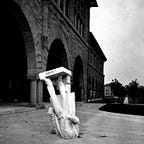What is to be done when there is nothing to be done? As little as possible, for a while, perhaps. It is a matter of gathering yourself together somewhere, of recognizing that you are nowhere gathered together.
Today is Wednesday. I am here waiting for nothing in particular and will be here waiting tomorrow, and the day after that. I’m most aware of cars blocking, people blocking, sounds blocking, and blocking nothing in particular. To remember is not cathartic unless one has nothing better to do. It is difficult to recall that I am blocking the natural course of things by putting myself before them so again, and again and again. It is more difficult to persuade myself of a natural course of things, as though the ‘way things really were’ could not admit of my grief at the way things really were without thereby losing this reality. The memory of an event, however blurred, is not exactly a fiction but an event in its own right. The authentic relation to the ‘way things really were’ which grief entails is itself the fiction, however necessary. I don’t know whether the feeling prompts it, or whether it prompts the feeling.
There is something even in regarding ‘feeling’ which is chastening at best and demeaning at worst. How telling that there is no English synonym for it which does not add some function to the form: we get no nearer the bone of ‘feeling’ than ‘sentiment’ and ‘care’, cleft from grief by intention. ‘Emotion’ is no nearer, cleft by time: one must emote before one feels, but may emote without feeling (though only as a child, perhaps). ‘Memory’ bears yet hazier mirrors: ‘recollection’, ‘echo’. Recollection is at once too broad — denoting any retrieval of a memory — and too certain, as though to remember the past were to resuscitate it unerringly. And how to reckon with an echo?
Is it this, to sound another?
This is, in fact, what we do in grieving, and grieving and grieving. We grieve what we seek to echo, and echo what we seek to clear. ‘Letting go’ in this sense is out of the question. Even to eschew memory is to echo it, to forge a fiction. We are condemned to draw a rose from the steel dust, to cast our memories from memories and forge some pattern of deeds to live with. Grieving is a matter of where in the pattern we gather ourselves, what deeds we shore against our ruin: the clarity between our pains, our boredoms and pleasures is the necessary fiction. Perhaps it is the most we can do not to gather ourselves in the deeds we have not done.
